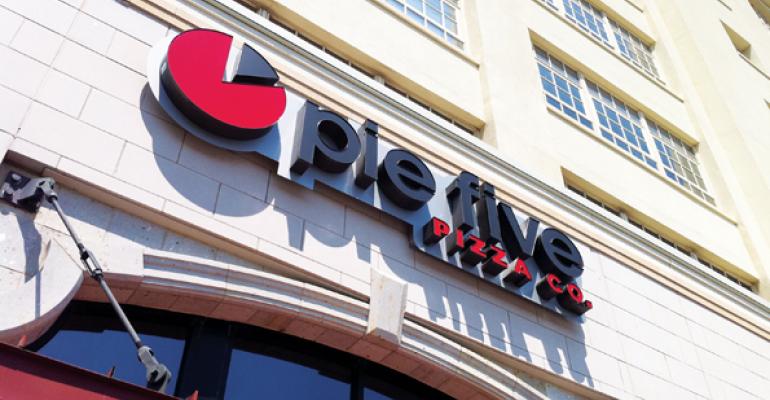 This post is part of the On the Margin blog.
This post is part of the On the Margin blog.
The wave of restaurant initial-public offerings is clearly over. A year has passed with not a single new chain having gone public. Now, with stocks stagnating, take-private deals seem more likely.
Here’s one candidate: Rave Restaurant Group.
The Plano, Tex.-based operator of Pie Five and Pizza Inn is the subject of periodic rumors of a take-private deal.
It makes sense: Pie Five is a legitimate, high-growth fast-casual pizza chain. And the company’s stock price has fallen so much that it has an enterprise value of just $40 million — certainly low enough to make it a relatively easy acquisition target for a number of investors.
Weakness among restaurant stocks seems to have dried the market for industry initial-public offerings, while making take-private deals more likely because stocks have gotten cheaper.
Rave has an interesting history. For most of its 58-year history, it was known as Pizza Inn, which first opened in 1958, became a buffet chain in 1969 and went public in 1993.
It spent the next 20 years in penny stock purgatory, never trading above $6 per share, and rarely above $4 — until 2013.
That was two years after the company created Pie Five, an outgrowth of an express unit that Pizza Inn wanted to create. Pie Five would be one of the first in a new generation of fast-casual pizza concepts that promised quickly made, individual pizzas and inspired silly comparisons to Chipotle.
In 2011, the stock spiked from $2.30 to more than $6 a share in November, but then fell back under $3 the next year. Investors rediscovered the company in 2013, however, and the stock would gradually increase before skyrocketing in 2015 to more than $15 a share by that March.
Between March 2013 and March 2015, Rave’s stock increased four-fold, the type of increase penny stock investors dream about.
But then, a series of disappointing earnings reports and the company’s lack of profits — it reported a net loss of $6.6 million in the first nine months of the year and has negative EBITDA — led to a steep decline. The stock closed Thursday at $3.85 a share.
Nearly all of those gains from that remarkable, two-year stretch were erased. It is in danger of returning to that penny stock purgatory.
The difference this time is that the company has Pie Five. And it would probably be better off away from the limelight of Wall Street, where the company can focus on the chain’s growth in its bid to become one of the major players in the fast-casual pizza sector.
That said, there are some concerns. The sector has already started to consolidate, and even some executives that had been boosters of the business are predicting its ultimate downfall.
Pie Five’s own same-store sales fell 4 percent in the most recent quarter, the second straight decline. The chain also closed three locations in the quarter ended March 27, which is not a good sign for a growth concept.
Still, Pie Five isn’t far removed from double-digit same-store sales growth. It’s also adding locations at a rapid clip. It had 85 locations as of March 27, more than double what it had a year ago. It has development agreements for many more, promising to continue that growth into the future. And despite concerns about consolidation and too many concepts, there’s plenty of evidence that fast-casual pizza has legs.
Contact Jonathan Maze at [email protected]
Follow him on Twitter at @jonathanmaze

